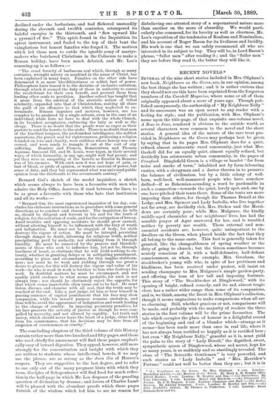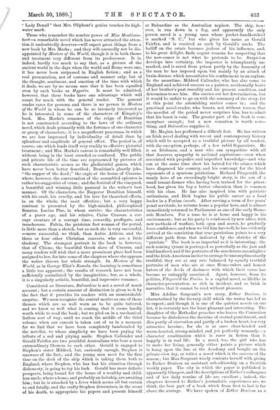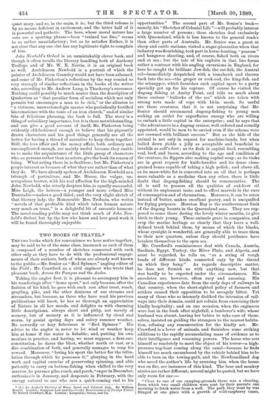RECENT NOVELS.*
SEVERAL of the nine short stories included in Mrs. Oliphant's new book, Neighbours on. the Green, are, in our opinion, among the best things she has written ; and it is rather curious that they should not ere this have been reprinted from the forgotten numbers of the Cornhill Magazine, where some or all of them originally appeared about a score of years ago. Though pub- lished anonymously, the authorship of " My Neighbour Nelly " and its successors was an open secret to any reader with a feeling for style; and the publication, with Mrs. Oliphant's name upon the title-page, of that exquisite one-volume novel, A Rose in June, rendered it obvious to the outside world, as several characters were common to the novel and the short stories. A general idea of the nature of the rare treat pro- vided in Neighbours on the Green may perhaps best be given by saying that in its pages Mrs. Oliphant does for a quiet, refined, almost aristocratic rural community, just what Mrs. Gaskell did for an equally quiet, almost equally refined, but decidedly less aristocratic urban community, in the pages of Cranford. Dinglefield Green is a village or hamlet " far from noise and smoke of town," inhabited not by farm-labouring rustics, with a clergyman and a doctor thrown in to preserve the balance of civilisation, but by a little colony of well- born, well-bred, well-mannered people who have somehow drifted—if so Bohemian-sounding a word be pardonable int such a connection—towards the quiet, lovely spot, and, one by one, have pitched their tents there. Some of the tents are more imposing than others, for though Sir Thomas Denzil at the Lodge, and Mrs. Spencer and Lady Isabella, who live together not far away, are decidedly rich, Mrs. Stokes and the Merri- dews are certainly poor ; while Mrs. Mulgrave, the kindly middle-aged chronicler of her neighbours' lives, has had the sensible prayer of Agur answered for her, and is troubled neither by poverty nor wealth. These external and non- essential accidents are, however, quite unimportant to the dwellers on the Green, when placed beside the fact that they all belong to the same caste. This fact is generally taken for granted, like the changeableness of spring weather or the duty of going to church ; but the Green sometimes becomes. acutely conscious of it, with a half-defensive, half-defiant consciousness, as when, for example, Mrs. Gresham, the stockbroker's young wife who, in spite of her prettiness and kindliness, has been received under protest, will insist on sending champagne to Mrs. Mulgrave's simple garden-party, and offering the loan of her tall and imposing footman. This story of " The Stockbroker at Dinglewood," with its. opening of bright, refined comedy, and its sad, almost tragic close, has a rather wider range than some of its companions, and is, we think, among the finest in Mrs. Oliphant's collection, though it seems ungracious to make comparisons when all are so charming. Still, whether gracious or not, comparisons will be made, and probably with the majority of readers the three stories in the first volume will be the prime favourites. The tale which occupies the place of honour is a delightful record of the beginning and end of a blunder which—strange as it seems—has been made more than once in real life, where it has not always been rectified so happily as it is rectified here ; but even " My Neighbour Nelly," graceful as it is, must yield. the palm to the story of " Lady Denzil," the dignified, sweet, sympathetic queen of Dinglewood, whose sad secret, kept for so many years, is so suddenly and so startlingly revealed. The close of " The Scientific Gentleman" is very powerful, and such stories as " Lady Isabella " and " Mrs. Merridew's Fortune" could not well be better than they are; but it is in ' (1) Neighbours on the Green. By Mrs. Oliphant. 3 vols. London : Macmillan and Co.—(2.) Masters of the World. By Mary A. M. Hoppus (Mrs. Alfred Marks). 3 vols. London : R. Bentley and Son.—(3.) Batoardine. By Vera Clavering. 3 vols. London : Hurst and Blackett.—(4.), Fitzgerald the Fenian. By J. D. Maginn. 2 vols. London: Chapman and Hall.—(5.) Esther Denison. By Adeline Sergeant. 3 vols. London : R. Bentley and Son.—(6.) John Newbold's Ordeal. By Thomas A. Pinkerton. 2 vols. London:. Swan Sonnenschein and Co.
Lady Denzil" that Mrs. Oliphant's genius touches its high- water mark.
Those who remember the sombre power of Miss Montizam- bart—a remarkable novel which has never attracted the atten- tion it undoubtedly deserves—will expect great things from a new book by Mrs. Marks ; and they will assuredly not be dis- appointed by Masters of the World, though it is in both theme and treatment very different from its predecessor. It is, indeed, hardly too much to say that, as a picture of the ancient world in the days when the world and Rome were one, it has never been surpassed in English fiction ; and as a real presentation, not of costume and manner only, but of the thought, sentiment, and emotion of the time with which it deals, we are by no means sure that it has been equalled even by such books as Hypatia. It must be admitted, however, that these books have one advantage which will count for much with the general reader. The general reader cares for persons, and there is no person in Masters of the World in whom he can be so intensely interested as he is interested in some of the characters of Kingsley's book. Mrs. Marks's romance of the reign of Domitian is not constructed according to the laws of the ordinary novel, which deals primarily with the fortunes of one character or group of characters ; it is a magnificent panorama, in which we are less impressed by individuality of detail than by splendour and amplitude of general effect. The period is, of course, one which lends itself very readily to effective pictorial treatment ; and Mrs. Marks's canvas is remarkably well filled, without being in the least crowded or confused. The public and private life of the time are represented by pictures of such characteristic scenes as the gladiatorial games, which have never been better described ; Domitian's ghastly joke, " the supper of the dead ;" the orgie at the house of Crassus, where, however, the conversation of the assembled epicures is rather too suggestive of cram ; and the festival of the vineyard, a beautiful and winning little pastoral in the writer's best manner. Of the characters, the Emperor Domitian himself, with his craft, his cruelty, and his love for theatrical effects, is, on the whole, the most effective ; but a very happy contrast is presented by the high-minded, philosophical Senator, Lucius Piso, in whom survive the characteristics of a purer age, and his relative, Gains Crassus, a cor- rupt creature of a corrupt time, cowardly, profligate, and treacherous. Fulvia, the patrician fast woman of the period, is little more than a sketch, but as such she is very successful, —more successful, we think, than Aulus Atticus, and the three or four other Christian converts, who are a little shadowy. The strongest portrait in the book is, however, that of Chione, the beautiful Greek slave of Crassus, and many readers will wish that a more prominent place had been assigned to her, for into some of the chapters where she appears the writer throws her whole strength. In Masters of the World, as in George Eliot's Bomola, the learning is sometimes a little too apparent ; the results of research have not been sufficiently assimilated by the imagination ; but, as a whole, it is a singularly artistic, beautiful, and impressive romance.
Considered as literature, Balcardine is not a novel of much account ; but a certain amount of distinction is given to it by the fact that it provides its readers with an unmistakable surprise. We soon recognise the central motive as one of those themes which are so well worn as to be quite tattered, and we know so well what is coming, that it seems hardly worth while to read the book ; but we plod on in a mechanical, listless sort of way, until we reach the middle of the third volume, when our conceit is taken out of us in a moment, for we find that we have been completely bamboozled by the novelist, to whose simplicity we have been paying the tribute of a sad and pitying smile. Stephen Callender and Gerald Fairfax are two youthful Australians who bear a most extraordinary likeness to each other. Gerald is engaged to Stephen's sister Mildred, but, curiously enough, Stephen is unaware of the fact ; and the young men meet for the first time on the deck of the ship which is taking them both to England, where Stephen, who has lost his situation through dishonesty, is going to try his luck. Gerald has more definite prospects, being bound for the house of a wealthy and child- less uncle, where a home, and probably an heirship, are awaiting him ; but he is attacked by a fever which seems all but certain to end fatally, and the crafty Stephen determines, in the event of his death, to appropriate his papers and present himself at Balcaxdine as the Australian nephew. The ship, how- ever, is run down in a fog, and apparently the only person saved is a young man whose pocket-handkerchief is marked "S. C.," but who gives his name as Gerald Fairfax, and is received as such by Gerald's uncle. The bailiff on the estate becomes jealous of his influence, and, to his great delight, finds cogent reasons for suspecting that the new-comer is not what he pretends to be. Suspicion develops into certainty, the impostor is triumphantly un- masked, and is saved from prison partly by the humanity of the man he has imposed upon, but mainly by an attack of brain-disease, which necessitates his confinement in an asylum. In the meantime, Mildred Callender, who has also come to England and achieved success as a painter, accidentally hears of her brother's past rascality and his present condition, and determines to see him. She carries out her determination, but it would be unfair to go on with the summary of the story, for at this point the astonishing matter comes in ; and the practised novel-reader, who boasts, not without reason, that the novelist of the period never surprises him, has to admit that his boast is vain. The greater part of the book is com- monplace enough ; but a new sensation is worth some- thing, and Balcardine supplies it.
Mr. Magian has performed a difficult feat. He has written an Irish novel dealing with recent and contemporary history which will be accepted as a truthful picture by all readers, with the exception, perhaps, of a few rabid Separatists. He is an Irishman, and a man who can sympathise with all that deserves sympathy in national aspirations—even when associated with prejudice and imperfect knowledge—and who can at the same time show his hatred for the crimes which have disgraced his country, and his contempt for the hired exponents of a spurious patriotism. Richard Fitzgerald, the manly hero of an exceedingly bright story, is the son of a small tenant-farmer who, having been trained for the priest- hood, has given his boy a better education than is common with his class. He has also inspired him with patriotic enthusiasm, and Dick begins his public career as a local leader in a Fenian entente. After serving a term of five years' penal servitude, he returns home a popular hero, and is almost immediately returned to Parliament as one of the early Home- rule Members. For a time he is at home and happy in his environment ; but as his party is reinforced by new allies, with new methods of warfare, both open and secret, he gradually loses confidence, and when we bid him farewell, he has evidently arrived at the conviction that true patriotism points to a very different path from that indicated by the shrieks of the "patriots." The book is as impartial as it is interesting : the rack-renting tyrant is portrayed as powerfully as the just and kind landlord, and if the portraits of the murderous moonlighter and the Irish-American inciter to outrage be uncomplimentarily truthful, they are at any rate balanced by equally truthful portraits of men who are at once Home-rulers and honest haters of the deeds of darkness with which their cause has become so unhappily associated. Apart, however, from its politics, Fitzgerald the Fenian is a capital novel, so lifelike in character-presentation, so rich in incident, and so brisk in narrative, that it cannot be read without pleasure.
Miss Adeline Sergeant's new story, Esther Denison, is characterised by the literary skill which the writer has led us to expect ; and though it is one of the quietest novels on our list, it is certainly not the least pleasant and interesting. The daughter of the Methodist preacher who leaves the Connexion because he disbelieves the doctrine of eternal punishment, and dies partly of starvation and partly of a broken heart, is a very attractive heroine ; for she is at once clear-headed and warm-hearted, strong-minded and yet perfectly womanly,—a character combination which is rarer in fiction than it happily is in real life. In a novel, too, the girl who has to make her living, generally either paints a picture which is hung upon the line at the Academy and bought on the private-view day, or writes a novel which is the success of the season ; but Miss Sergeant wisely contents herself with giving to Esther Denison an assistant sub-editorship on a Scottish weekly paper. The city in which the paper is published is apparently Glasgow, and the descriptions of Esther's colleagues and of her daily routine of life are excellent ; indeed, the chapters devoted to Esther's journalistic experiences are, we think, the best part of a book which from first to last is far above the average. We have spoken of Esther Denison as a quiet story, and so, in the main, it is; but the third volume is by no means deficient in excitement, and the latter half of it is powerful and pathetic. The hero, whose moral nature has —to use a sporting phrase—been " trained too fine," seems to us rather unsatisfactory; but as he satisfies Esther, it is not clear that any one else has any legitimate right to complain of him.
John Newbold's Ordeal is an unmistakably clever book, and though it often recalls the literary handling both of Anthony Trollope and of Mr. W. E. Norris, it is an original book as well. Archdeacon Newbold is a portrait of which the painter of Archdeacon Grantley would not. have been ashamed, and some of Mr. Pinkerton's reflections by the way remind us very strongly of similar reflections in the books of the writer who, according to Mr. Andrew Lang, is Thackeray's successor. Nothing could possibly be much neater than the description of Quakerism as " that peculiar form of socialism which not only permits but encourages a man to be rich," or the allusion to " a virtuous, unsweetened-gin master who periodically fortified his conscience with the tonic of an iron church," and of similar bits of felicitous phrasing, the book is full. The story is a thing of subsidiary importance, but it is there notwithstanding, and can give a good account of itself, Mr. Pinkerton being evidently old-fashioned enough to believe that his piquantly drawn characters and his good things generally are all the better for having a thread of narrative to keep them together. Still, the love affair and the money affair, both ordinary and uncomplicated enough, are mainly useful because they enable us to make the acquaintance of the little group of characters who, as persons rather than as actors, give the book its reason of being. What acting there is, is faultless ; but Mr. Pinkerton's people interest us because of what they are rather than of what they do. We have already spoken of Archdeacon Newbold as a triumph of portraiture, and Mr. Biscoe, the vulgar, -un- scrupulous brewer, with his real affection for the high-minded John Newbold, who utterly despises him, is equally successful. Miss Leigh, the heiress—a younger and more refined Miss Dunstable—makes a good third ; and the very slight sketch of that literary lady, the Honourable Mrs. Trefusis, who writes " novels of that profitable kind which takes human nature very much on trust," is a delightful bit of sarcastic humour. The novel-reading public may not think much of John New- bold's Ordeal, but by the few who know and love good work it will be found thoroughly enjoyable.




















































 Previous page
Previous page